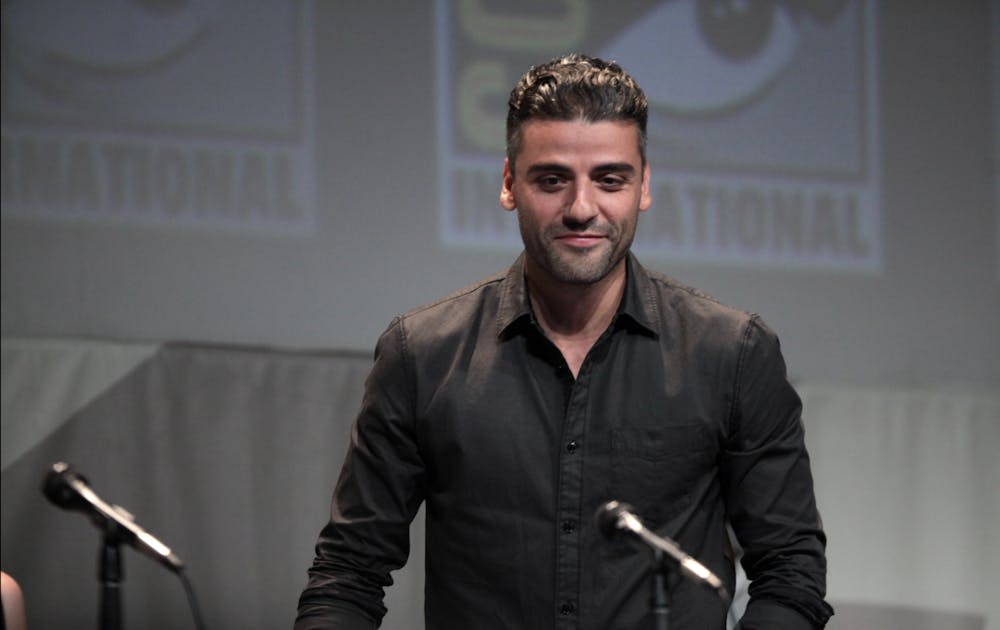“A good movie starts when you walk out of the theater.” Those are the words of legendary writer-director Paul Schrader, the man behind the screenplays of American greats such as Taxi Driver and Raging Bull. His latest directorial effort, completed in collaboration with Martin Scorsese, embraces that very idea — and amplifies it to a magnitude you cannot ignore.
The said film is The Card Counter, having made its world premiere at the Venice Film Festival just days before its theatrical release. Another entry in Schrader’s fascination with tortured men, it’s an inscrutable thriller and one that you can’t quite get your head around until you’ve watched it, processed it, reprocessed it and processed it more. Characterized by skillful nuance and alarming realism, it continually goes where you last expect, developing into a journey where dread, euphoria and sympathy are all stops along the way.
The core idea behind it is this: William Tell (Oscar Isaac) is a poker player and ex-military man making his rounds through American casinos, having learned to count cards back when he was in prison. His attendance at one fateful event leads to the meeting of an unreadable young man, Cirk (Tye Sheridan). This encounter shifts his life’s axis, prompting him to step out of his solitary sphere and into a precarious realm of possibilities.
Good old-fashioned narration is how the film chooses to make its opening remarks. But there’s nothing typical about what’s being said and how it’s said — the voice-over of William is inherently suggestive of a dark side and thus tantalizingly interesting. He ruminates about his odd acclimation to prison life and his affinity for gambling before we move to his present-day life as a free man. Only it’s not quite a life as it is an existence, a chillingly monotonous one in which he passes unseen through anonymous motel rooms.
Rather early on, William has his first interaction with someone who might be his saving grace. An effervescent poker stable owner, she goes by La Linda (Tiffany Haddish). The two quickly strike up an unlikely friendship, brimming with romantic undertones. We learn that William plays neither for the money nor the fame after he refuses La Linda’s offer to stake him. For now, however, his past and the reason for a near decade-long incarceration are topics purposefully left untouched.
This soon changes when Cirk approaches him in the midst of a seminar held by Major John Gordo (Willem Dafoe). As they meet seated across from one another, William’s world-weary cynicism has at last met a match with Cirk’s sloppy naïveté. The two think differently and live differently, yet William resolves to take the latter under his wing. His goal is to get Cirk a new start, which begins with tackling the young man’s host of money and family issues. Here is where things take off — exposition aplenty, the film decides it’s high time to charge into its gritty themes.
At this point, the fact that The Card Counter is a film of metaphors and abstractions is a realization that is slowly becoming clear. It is decidedly not about a virtuous new life and even less so about gambling. Rather, it happily inhabits the genre of film noir, where the protagonist’s inner demons take center stage. Ordinary interactions hold a deeper, darker meaning. For instance, a terse moment when William loses a game to one of his memorably recurring opponents shows not two men shaking hands, but the head-on collision of patriotic idealism and disillusionment.
Certain levels of experimentation enhance this, made all the better by Schrader’s willingness to explore outside of traditional indie filmmaking. The lighting and lens type, even drawing from virtual reality technology, are tools he manipulates distressingly well in flashback scenes. Another sequence is made unforgettable through the use of visual effects, giving rise to a beautiful yet haunting moment of reawakening.
But as much as this may be one of the best works of the year, it still isn’t without its imperfections. While we dive unnervingly deep into William’s inner turmoil, we are ultimately barred from fully grasping the other characters’ psyches.
The majority of the film permits — and even invites — us to understand Cirk, the radically different burden he holds and his damaging approach to life that William wishes to correct. Yet his perspective, at its most complex and narratively rich, is all but entirely omitted near the end, creating an inconsistent, disorienting conclusion to his character. Likewise, La Linda’s final decision, if aided with more context and backstory, would have landed with far greater impact.
Just about the very last element you take notice of is the acting, the story being as immersive as it is. Isaac’s command of the screen is irrefutable, a career-best performance that is sure to linger in audiences’ minds come awards season. Though William is stoic, the moments where we glimpse his pain are bursting with emotion and vulnerability. One particular scene, a pinnacle of the film, makes full use of Isaac’s magnetic intensity — the results are nothing short of terrifying.
It’s a tall order to make sense of The Card Counter — even by its end, the questions you want answered still hang resolutely in the air. But that is the brilliance of it. The film morphs and evolves, like a puzzle continually rearranging itself as you attempt to crack it; the exercise is simply to study it, not to solve it. And indeed, it is a painstaking study. It is an investigation into the gnawing of a moral weight, a scrutinization of internal and external forces. It’s a resonant world of turmoil and vice, and once you’re in, Schrader never quite lets you out.





